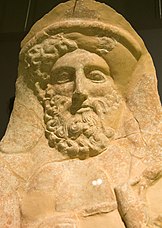The Apollonian and the Dionysian are philosophical and literary concepts represented by a duality between the figures of Apollo and Dionysus from Greek mythology. Its popularization is widely attributed to the work The Birth of Tragedy by Friedrich Nietzsche, though the terms had already been in use prior to this,[1] such as in the writings of poet Friedrich Hölderlin, historian Johann Joachim Winckelmann, and others. The word Dionysian occurs as early as 1608 in Edward Topsell's zoological treatise The History of Serpents.[2] The concept has since been widely invoked and discussed within Western philosophy and literature.
In Greek mythology, Apollo and Dionysus are both sons of Zeus. Apollo, son of Leto, is the god of the sun, art, music, poetry, plague and disease, of rational thinking and order, and appeals to logic, prudence and purity and stands for reason. Dionysus, son of Semele, is the god of wine, dance and pleasure, of irrationality and chaos, representing passion, emotions and instincts. The ancient Greeks did not consider the two gods to be opposites or rivals, although they were often entwined by nature.
- ^ Adrian Del Caro, " Dionysian Classicism, or Nietzsche's Appropriation of an Aesthetic Norm" (in English), in Journal of the History of Ideas, Vol. 50, No. 4 (October–December 1989), pp. 589–605. JSTOR 2709799.
- ^ Topsell, Edward (1608). The History of Serpents. Published by William Jaggard.

